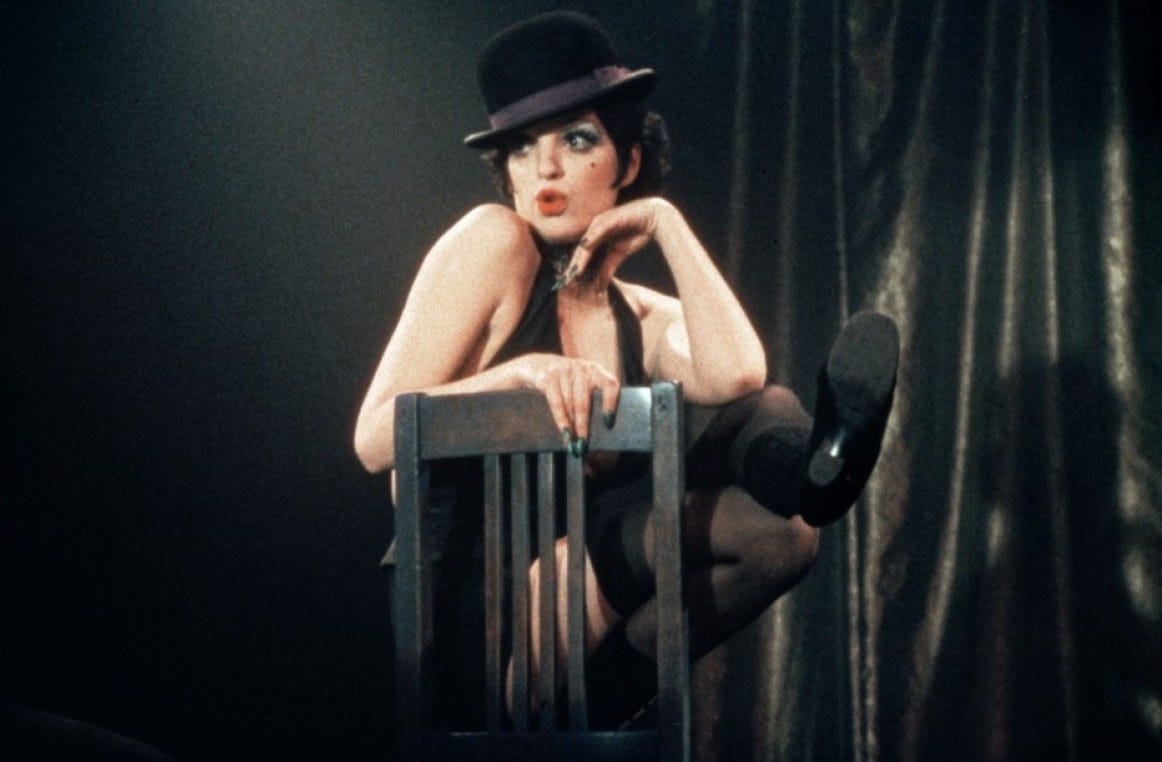Shalom!
The Broadway Maven’s classes are on hiatus. This week, the April FREE issue of the Weekly Blast comes a week early, because next week there will be no issue for the observance of Passover.
This Weekly Blast focuses tightly on one subject: Bob Fosse’s 1972 film version of Cabaret.
There is also a LAST BLAST about Spamalot.
Perhaps the greatest movie musical ever, Bob Fosse’s 1972 triumph Cabaret is filled with various symbols and images that help illustrate the themes of the film. I’ve thought a lot about this film, and here I run down some of the things you’d know “if You Could See Fosse’s Cabaret Through My Eyes.”
What does the Kit Kat Klub symbolize? The Kit Kat Klub symbolizes (among other things) Hell:
• The main colors are red, black, and white. In addition to their netherworld associations, those three also happen to be the colors of the Nazi flag.
• The cabaret is in the basement, and patrons have to walk down stairs to get there.
• The Emcee declares “Here it is so hot…”
• The Emcee is the Devil of the Kit Kat Klub, with his cane doubling as a pitchfork.
What do the names symbolize? Cabaret is filled with symbolic names:
• The wealthy nubile Berliner is known as Natalia Landauer (LAND, DOWRY).
• The wealthy bachelor is Maximillian (MILLION).
• There’s a prostitute named Fraulein Kost (COST).
• Despite the growing threat of the Nazi era, the main female character “sallies forth” (SALLY).
• The protagonist in the film, a well-educated writer and teacher, is named Brian (BRAIN).
What does “Mein Herr” refer to? In addition to meaning “Sir” or “Mister,” the word “Herr” is German for Lord. Sally is saying “Goodbye, God” when she sings “Bye bye mein lieber Herr.” For a woman who likes to talk about “divine decadence,” it’s an apt song to sing as Germany descends into darkness.
Is “Tomorrow Belongs to Me” really anti-Semitic? With it’s bucolic imagery (it starts “The sun on the meadow is summery warm; The stag in the forest runs free”) the song “Tomorrow Belongs to Me” doesn’t seem on the surface to be anti-Semitic. Some viewers of the film may perceive it as being a Nazi song only because of who’s singing it and the fact that the boy leading the song is wearing a swastika and gives the Hitler salute. But anti-Semitic it is, because of the German concept of the Volk (pronounced “Folk). That philosophy connects the German people to the German language, the Christian religion, German history, and most importantly the German land itself. So singing about German nature is a way of praising Aryans to the exclusion of the group that was their binary opposite at the time — the Jews.
Is “If You Could See Her Through My Eyes” really anti-Semitic? One of the mysteries of the film is the Emcee’s true attitude toward the Nazi attitude toward Jews (the 1993 revival ruined the ambiguity by revealing the Emcee to be a gay Jew in the last moment of the show). At the end of “Tomorrow Belongs To Me,” as the audience is still stunned by the casual anti-Semitism at the picnic, the Emcee appears briefly with a wicked grin on his face. So later, at the end of his dance with the gorilla, when he says “She wouldn’t look Jewish at all,” it’s not exactly clear if he’s making fun of Jews or making fun of people who make fun of Jews.
What’s the deal with “old chum”? “Life is a Cabaret, old chum…” Sally sings in the title number. And of course chum means “buddy” or “pal.” But it also means “fish that are used to feed other fish” — an interesting metaphor for the looming Holocaust.
Who is “Elsie”? Well into her “eleven o’clock number,” Sally sings of a former roommate named Elsie, a prostitute who died from “too much pills and liquor.” Yet in declaring that “Life is a Cabaret,” she sings “When I go, I’m going like Elsie.” Now, Elsie is not an actual roommate of Sally Bowles. Sally is singing about a woman who is singing about her roommate Elsie. But who is Liza Minnelli singing about?
I would like to suggest that she’s singing about her mother, who had passed just a few years earlier. Now, of course when Kander & Ebb wrote those lyrics they weren’t thinking of Judy Garland. But I can just imagine Bob Fosse whispering in Liza’s ear “Think about your mother” — and I think you can see it on her face at the end of the song.
LAST BLAST: Based on the parody film "Monty Python and the Holy Grail," Spamalot takes the comedy one step further by satirizing musical theater itself. The show is full of references to other musicals, including Phantom of the Opera, Singing in the Rain, and Company. "Another hundred people just contracted the plague." This is most evident in the big production number "You Won't Succeed on Broadway if You Don't Have Any Jews" wherein Sir Robin quotes lyrics from Funny Girl's "People," leads the ensemble in the famous Bottle Dance from Fiddler on the Roof (accompanied by “Hava Nagila”), and brings in a classic kick line with a rousing "Papa, can you hear me?!" (Karina Carr)
The Broadway Maven, David Benkof, helps students further their appreciation of musical theater through his classes, his YouTube Channel, and his Weekly Blast. Contact him at DavidBenkof@gmail.com.



